Cập nhật: 01-01-1970 12:00:00 | Blogs about Vietnam | Lượt xem: 1089
Welcome to a flavorful journey through the heart of Hanoi! In this guide, the team at Bonzer Tour presents 15 must-try local dishes in Hanoi and the top spots to savor them — from steaming bowls of phở by street-corner vendors to iconic treats like egg coffee in a cozy café. Whether you’re a first‑time visitor or a seasoned Hanoian food‑lover, this list is your passport to authentic tastes, trusted addresses, and the vibrant culinary heritage of Vietnam’s capital.
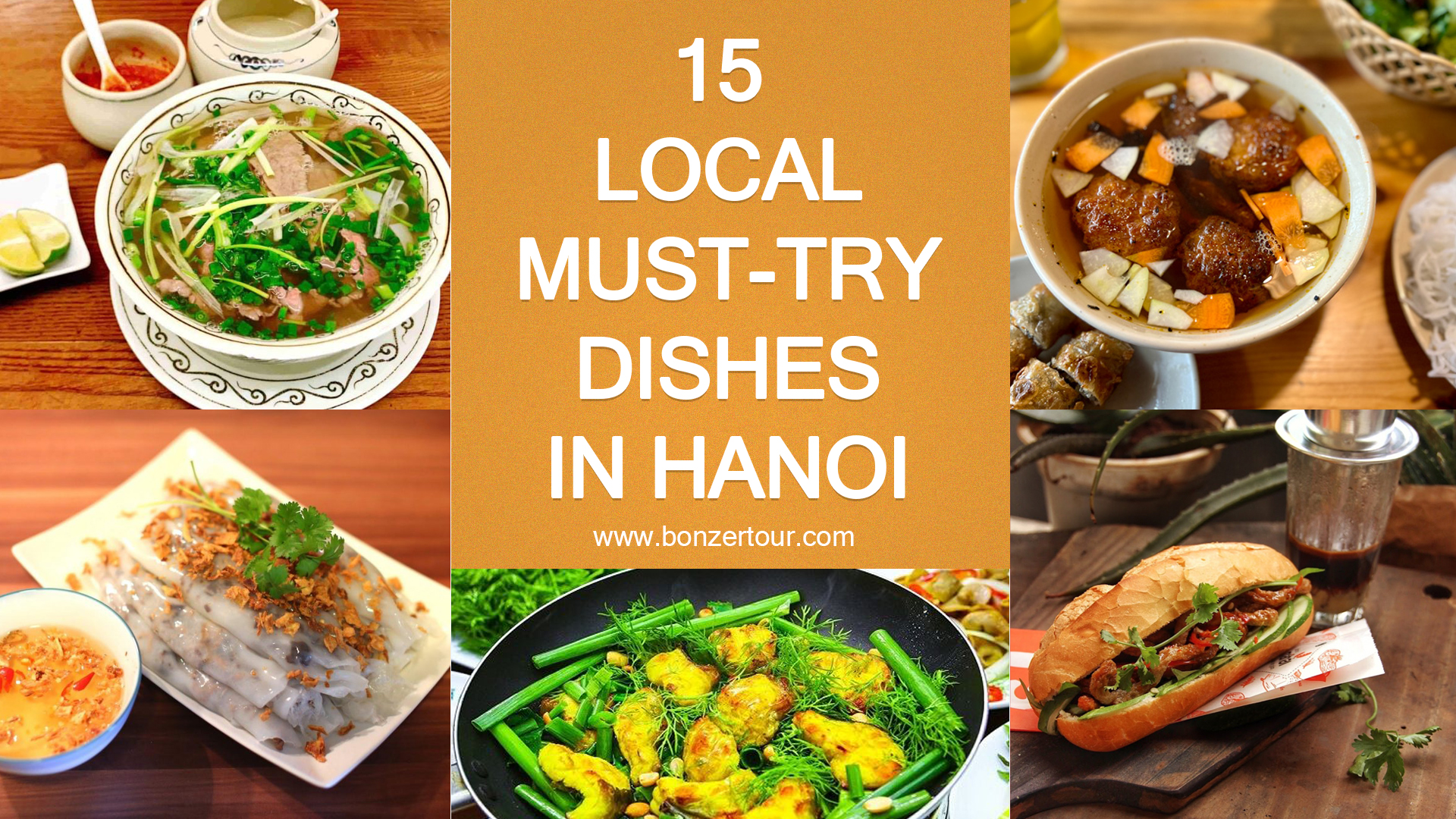
The broth, simmered for hours with beef or chicken bones, charred ginger, onions, and fragrant spices like star anise and cinnamon, is clear yet intensely flavorful. Although the business of selling Pho is available all over the world, it’s highly recommended to try the original taste in Hanoi, as it won’t be similar elsewhere.
Recommended places to eat:
Bún Chả is the quintessential Hanoi dish, perfectly capturing the city’s love for charcoal-grilled flavors and fresh herbs. It consists of grilled pork — both minced patties and thinly sliced belly — served in a bowl of warm, tangy fish sauce broth alongside a generous plate of rice vermicelli (bún) and a basket of fresh herbs. The pork is marinated with garlic, shallots, fish sauce, and a touch of sugar before being grilled over open charcoal, giving it a smoky aroma that fills the streets during lunchtime.
Diners mix everything — dipping noodles and herbs into the sauce — to create a harmony of sweet, sour, salty, and smoky flavours.
Recommended places to eat:
Bánh Cuốn, or steamed rice rolls, is delicate yet deeply flavorful. Each roll is made from a thin, silky sheet of rice batter steamed just long enough to achieve a soft, translucent texture, then filled with a savory mixture of minced pork and wood ear mushrooms.
The rolls are gently folded and topped with crispy fried shallots, served alongside slices of Vietnamese pork sausage (chả lụa) and a bowl of warm fish sauce for dipping. What makes Bánh Cuốn uniquely Hanoi is the balance of flavors — light yet rich, simple yet refined.
Recommended places to eat:
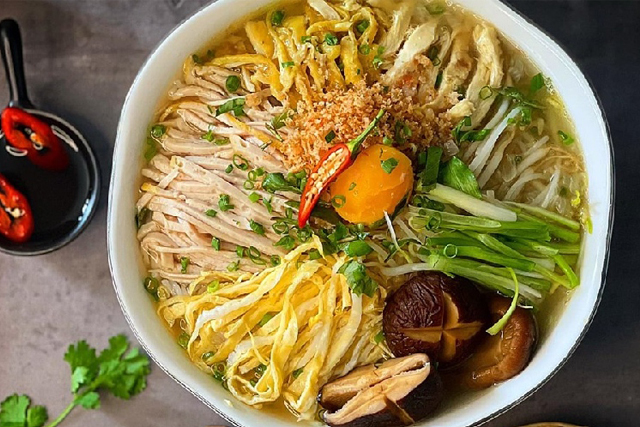
Bún Thang is one of Hanoi’s most elegant and refined noodle soups — a dish that showcases the city’s subtlety and attention to detail. Originally a festive meal served during Tết (Lunar New Year) to use up leftover ingredients, it has evolved into a culinary symbol of Hanoi’s sophistication. The dish’s name, “thang,” means “ladder,” referring to the many ingredients carefully layered together.
The broth, clear and golden, is meticulously simmered from chicken bones, dried shrimp, and aromatic mushrooms, resulting in a light yet deeply layered flavor. Fine rice noodles are topped with delicately shredded chicken, thin omelet strips, julienned Vietnamese ham (giò lụa), and a sprinkle of fragrant herbs. Some locals add a few drops of mắm tôm (fermented shrimp paste) for extra depth — a bold touch that true Hanoians appreciate.
Recommended places to eat:
Chả Cá Lã Vọng is perhaps Hanoi’s most storied dish — a centuries-old specialty that turns a simple piece of fish into a fragrant, sizzling masterpiece. Traditionally made with cá lăng (catfish or snakehead fish), the dish features chunks of marinated fish grilled and then pan-fried tableside with generous handfuls of fresh dill and scallions.
The marinade — a blend of turmeric, galangal, and fish sauce — infuses the fish with a golden color and aromatic depth that fills the air as it cooks. Diners assemble their own bowls with rice vermicelli, roasted peanuts, fresh herbs, and a light shrimp paste dipping sauce (mắm tôm) adjusted with lime and chili. The experience is as much about the interactive cooking as it is about the taste — smoky, herbal, and distinctly northern.
Recommended place to eat:
The dish features a tangy, tomato-based broth enriched with crab paste (riêu cua), giving it a light yet savory depth unique to northern Vietnam. Freshwater crabs are pounded by hand and strained to extract their delicate flavor, then cooked slowly until soft curds of crab float to the surface — a signature hallmark of an authentic bún riêu.
The soup is typically served with thin rice noodles, fried tofu, tomatoes, and sometimes pieces of pork or snails, topped with a scattering of scallions and perilla leaves. A dash of shrimp pastes or chili adds extra punch for those who love bold flavors.
Recommended places to eat:
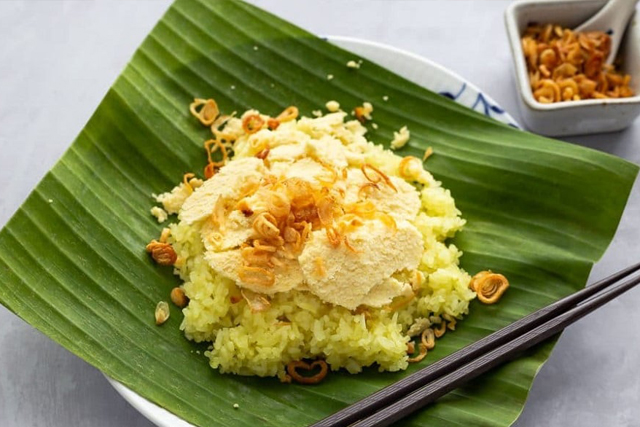
Xôi Xéo is a classic Hanoi sticky rice dish, distinguished by a layer of finely mashed, golden mung beans spread over soft, fragrant glutinous rice. Each bite combines the chewy texture of the rice with the rich, savory flavor of chicken fat and the crispy crunch of fried shallots, creating a harmonious balance of taste and aroma.
Often enjoyed for breakfast or as a light snack, Xôi Xéo is both comforting and energizing, offering a warm, satisfying start to the day. More than just a meal, it reflects the simple, nostalgic essence of Hanoi’s culinary culture.
Recommended places to eat:
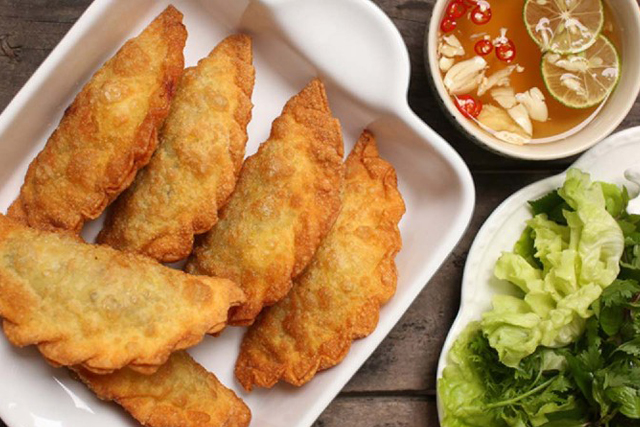
Bánh Gối, often called “Vietnamese savory pastry” or “fortune pillow,” is a beloved street food snack in Vietnam. It features a golden, crispy pastry shell filled with a flavorful mixture of minced pork, mushrooms, vermicelli, and sometimes quail eggs or vegetables. Deep-fried to perfection, each Bánh Gối offers a satisfying crunch that gives way to a rich, savory filling.
Recommended places to eat:

Cà Phê Trứng, or Vietnamese egg coffee, is a unique and indulgent drink that originated in Hanoi. It features strong, aromatic Vietnamese coffee topped with a creamy, frothy mixture of whipped egg yolks and sweetened condensed milk. The result is a rich, velvety layer that contrasts perfectly with the bold, slightly bitter coffee beneath.
Traditionally served warm in a small cup, Cà Phê Trứng offers a luxurious and comforting experience, often enjoyed slowly while savoring the aroma and flavor. This iconic beverage reflects the creativity and distinct tastes of Vietnamese coffee culture.
Recommended places to eat:
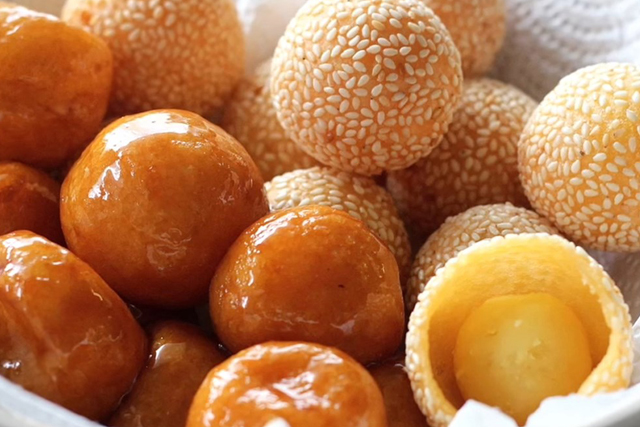
Bánh Rán is a traditional Vietnamese deep-fried pastry, popular as a snack or dessert across the country. It consists of a crispy, golden-brown outer shell made from glutinous rice flour, enclosing a sweet filling—often made of mung bean paste with a hint of coconut and sugar. Some versions include a savory filling, combining meat, mushrooms, and spices.
Recommended places to eat:
W Bún Cá is a traditional Vietnamese noodle soup that showcases the delicate flavors of fresh fish. Originating from Northern Vietnam, it features vermicelli noodles served in a clear, fragrant broth made from simmered fish bones, herbs, and sometimes tomato or pineapple for a subtle tang. Tender pieces of fried or poached fish are added, along with fresh herbs, bean sprouts, and occasionally a splash of fish sauce, creating a harmonious balance of savory, sweet, and slightly sour notes.
Often enjoyed as a hearty breakfast or lunch, Bún Cá highlights the Vietnamese skill of turning simple, local ingredients into a light yet deeply flavorful dish.
Recommended places to eat:
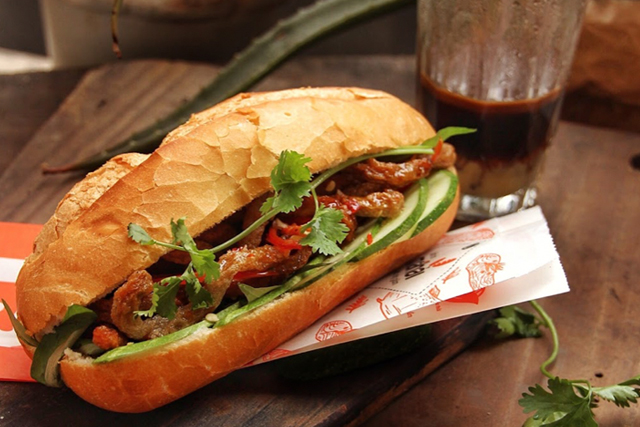
Bánh Mì is Vietnam’s iconic sandwich, celebrated for its perfect harmony of textures and flavors. It features a crispy, airy baguette—a legacy of French influence—filled with a variety of ingredients such as savory cold cuts, pâté, pickled vegetables, fresh herbs, and a touch of chili or mayonnaise.
Each bite delivers a delightful contrast: the crunch of the bread, the freshness of the vegetables, and the rich, savory fillings. Often enjoyed as a quick breakfast or street food snack, Bánh Mì reflects Vietnam’s culinary creativity, blending local ingredients with international inspiration to create a simple yet unforgettable meal.
Recommended places to eat:

Nem Rán, also known as Vietnamese fried spring rolls, is a classic and recommended in a Vietnamese Culinary Tour by Bonzer Tour. These crispy rolls are made by wrapping a flavorful mixture of ground pork, shrimp, mushrooms, glass noodles, and aromatic herbs in thin rice paper, then deep-frying until golden and crunchy. Each bite offers a satisfying contrast between the crisp exterior and the savory, tender filling inside.
Often served with fresh lettuce, herbs, and a tangy dipping sauce, Nem Rán is a staple at family meals, festive occasions, and street food stalls alike, embodying the balance of textures and flavors that defines Vietnamese cooking.
Recommended places to eat:
Bún Ốc is a traditional Vietnamese noodle soup that features snails as its star ingredient, offering a unique and flavorful taste of Hanoi’s Street cuisine. The dish consists of vermicelli noodles served in a tangy, savory tomato and tamarind-based broth, enriched with slow-cooked snails, tofu, and sometimes tomatoes or herbs.
Fresh herbs, lime, and chili are added to enhance the aromatic and slightly sour flavor, creating a complex yet refreshing profile. Often enjoyed as a hearty lunch or dinner, Bún Ốc highlights the Vietnamese talent for turning simple, local ingredients into a dish that is both comforting and distinctive.
Recommended places to eat:
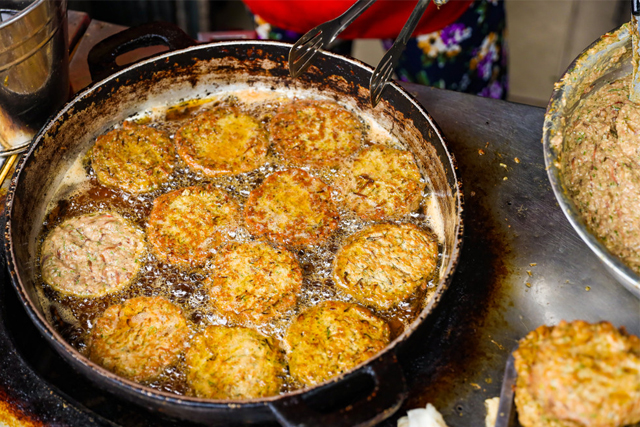
Chả Rươi is a rare and highly prized Vietnamese delicacy, especially popular in Northern Vietnam during autumn when sandworms (rươi) are in season. The dish is made by mixing fresh rươi with eggs, onions, dill, and sometimes a touch of fish sauce, then pan-frying the mixture into golden, aromatic patties.
Each bite offers a rich, slightly briny flavor with a delicate, tender texture, complemented by the fragrant herbs. Chả Rươi is often served with rice or eaten as a snack, celebrated for its seasonal uniqueness and the skill required to prepare it, making it a true highlight of Vietnamese culinary tradition.
Recommended places to eat:
Is the list tempting to you? It's highly recommended to embark on a Hanoi walking food tour exploring tasty and authentic dishes in this cultural city.















